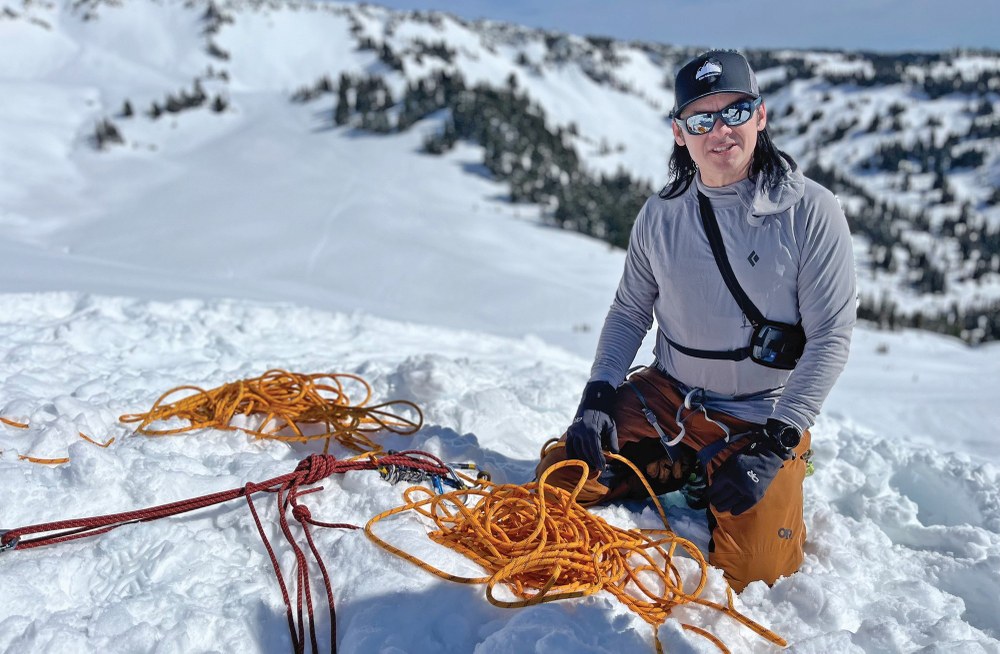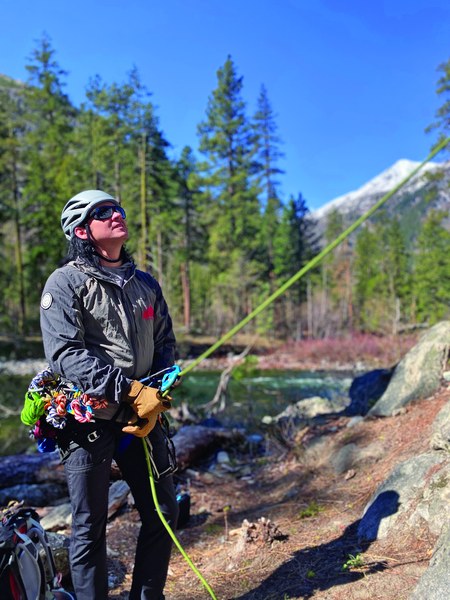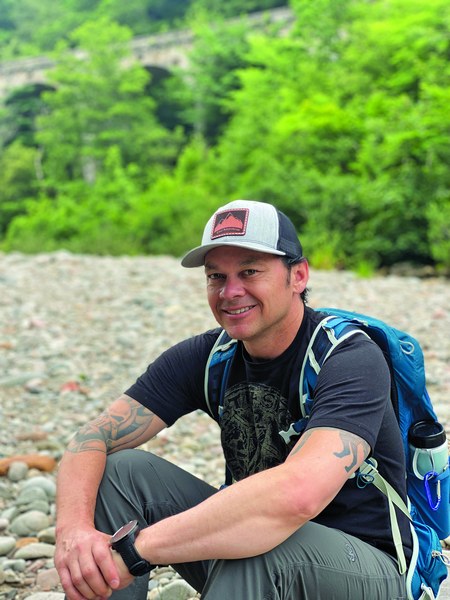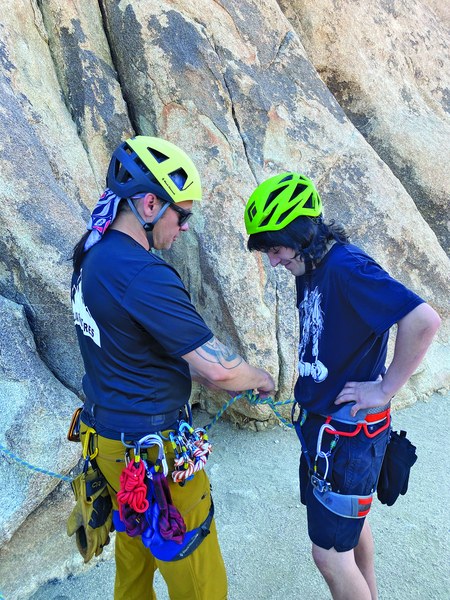
I can introduce myself in many ways: a member and volunteer of The Mountaineers, a guide, a rescue specialist, and a Doctor of Education. Beyond these roles, and more importantly, I am a Native American who is a proud member of the Cherokee Nation. As my grandfather would say, “I find myself caught between two fires,” advocating for the rights of Native Americans and the rights of outdoor enthusiasts. Sometimes, these two do not align. There is a lack of representation of Native Americans and other peoples of color in the outdoors. However, one area in which they do align – and can have the most significant impact – is outdoor leadership and education.
I am incredibly lucky to live in the Pacific Northwest. Being able to climb mountains like Rainier, Adams, St. Helens, Baker, and others is a privilege. I’m also fortunate to participate in organizations that make the outdoors safer and more accessible. As a member of the Tacoma Mountain Rescue Unit, I help people who get into trouble in our exceptional outdoor environments and teach classes on outdoor skills to keep recreationists safe. And as a volunteer for the Liz Rocks Foundation, I support efforts to bring the outdoors to audiences and ethnicities who might otherwise not have the opportunity to enjoy our natural world.
Through these experiences, I’ve come to understand the importance of outdoor leadership and education, and how they can be used to transform not only our outdoor trips but also our lives. The experiences shared in the outdoors, the bonds forged through adversity, and the interconnectedness of the natural world all contribute to developing compassionate and empathetic leaders who pave the way for a more sustainable and just future.
 Dennis belaying a climber in Leavenworth during an Intro to Climbing course.
Dennis belaying a climber in Leavenworth during an Intro to Climbing course.
The transformative power of outdoor leadership and education
Outdoor leadership and education have a power that extends far beyond the boundaries of individuals, rippling through communities to foster a sense of belonging, connection, and collective responsibility. The outdoor opportunities provided through outdoor education bring people together from diverse backgrounds and experiences, breaking down barriers and creating spaces for mutual learning and understanding. Through shared outdoor experiences, ideas and cultural insights are exchanged between peoples, and individuals who might not have otherwise interacted elsewhere discover a sense of community as they come together on a course or trip.
The role of Native Americans as outdoor education leaders holds significant importance in fostering a deeper connection between individuals and the natural world. Tribes hold vast cultural knowledge about the lands and where they live, and this cultural connection translates to a wealth of knowledge about flora, fauna, weather patterns, and survival techniques. Beyond just textbook information, intergenerational expertise about the land embraces both scientific and cultural dimensions, encompassing a holistic understanding of specific plants, animals, and landscapes' spiritual, historical, and cultural significance. As Mountaineers, we know sharing stories, engaging in practical activities, and immersing learners in the environment creates memorable and impactful learning experiences. Native American tribal cultures’ teaching methods are often experiential, story-based, and hands-on which align with effective outdoor education practices.
 Dennis taking a break during a hike near Piclochery, Scotland.
Dennis taking a break during a hike near Piclochery, Scotland.
The nature connection
An important aspect of outdoor leadership and education is the ability to foster personal growth and connection with nature. Immersion in the natural world provides a space for self-reflection, introspection, and self-discovery, challenging individuals to face adversity and develop psychological and physical resilience. Rugged landscapes, unpredictable weather, and physical demands of outdoor activities are the fertile ground for essential life skills to grow.
As individuals engage with awe-inspiring vistas, the tranquility of a forest, or the power of a rushing river during their outdoor education experiences, a sense of wonder is evoked that instills a desire to protect and preserve the natural world. These immersive experiences foster an evolving understanding of and appreciation for the intricate web of life and the importance of environmental conservation and advocacy.
Connection with nature fostered through outdoor leadership and education also deepens our awareness of place and history. In the outdoor community, we find ourselves at a crossroads regarding Native languages and the place names of the spaces where we recreate. We have grown up calling mountains by their colonized names created in conquest during the 18th and 19th centuries. By acknowledging and using the Native American names, we are helping to correct those actions. Many Native American languages are endangered, and outdoor education provides a context where these languages can be preserved and revitalized. Incorporating Indigenous languages in outdoor education preserves linguistic heritage and strengthens the connection between language, culture, and the environment.
 Dennis belay instructing a new climber.
Dennis belay instructing a new climber.
Empowering future leaders
Outdoor leadership and education cultivate competent, compassionate, and mindful leaders who understand the value of serving others and the planet. Native Americans play a pivotal role in this work. By sharing our perspectives, stories, and practices, we cultivate respect and appreciation for diverse cultures, facilitate cross-cultural dialogue and understanding, and promote unity and cooperation among communities. Additionally, the presence of Native American leaders in outdoor education serves as an inspiration for Indigenous youth to pursue careers in environmental science, education, conservation, and related fields, and take pride in their cultural heritage while engaging with contemporary issues.
Shaping the lives we lead
Native American outdoor education leaders bridge traditional wisdom and modern environmental education. Their cultural heritage, connection to the land, teaching methods, and commitment to stewardship bring a unique and valuable perspective to outdoor education, enriching the learning experience and fostering greater respect for nature and diverse cultures.
As we reflect on the transformative power of outdoor leadership and education, we are reminded of their immense potential for shaping the future. I encourage you all to embrace outdoor leadership and education, and to foster personal growth, environmental stewardship, and the development of resilient and compassionate leaders. Let us venture into the wilderness, explore the unknown, and allow the transformative power of outdoor experiences to shape our lives and the lives of those we lead, creating a ripple effect that positively impacts individuals, communities, and the world.
Learn more about The Mountaineers commitment to honoring and upholding tribal rights and cultural lifeways.
This article originally appeared in our fall 2024 issue of Mountaineer magazine. To view the original article in magazine form and read more stories from our publication, visit our magazine archive.
 Dennis Eller
Dennis Eller